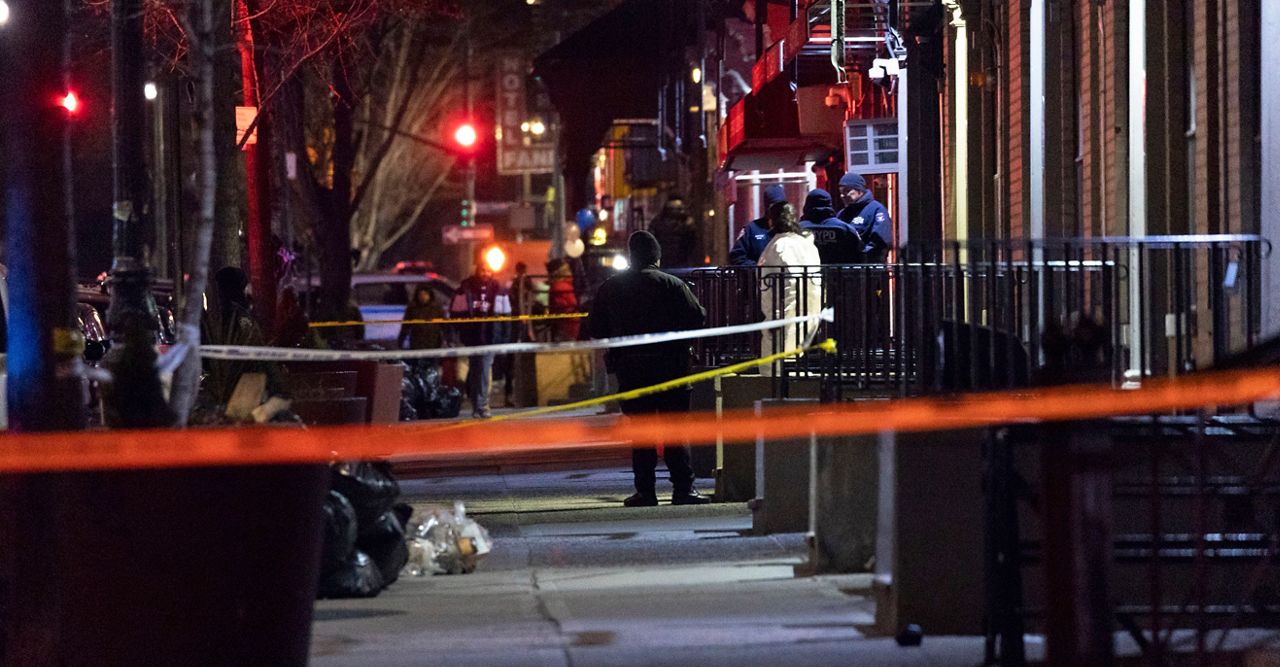NEW YORK — As the city reels from a series of high-profile crimes this month, including two police officers killed in the line of duty, a fatal shoving of a woman onto the subway tracks and an 11-month-old hit by a stray bullet, public safety is on many New Yorkers’ minds.
Jessica Sinodis moved to New York City from Arizona a few months ago and was taken aback by the string of violence.
“It's definitely surprising, because you think that, after so many years, it wouldn't be like it used to be, but it's still happening a lot,” said Sinodis, 23, who visited the city as a child.
There were 73 shooting incidents in the city from Jan. 1 through Jan. 23, compared with 59 the same period last year, according to NYPD data.
Overall crime rates in the city are significantly lower than they were in the 1980s and 1990s, but the perception of an increased level of crime and violence has ramifications for the city and its residents already dealing with pandemic life.
“Sometimes I'll get off work at 3 a.m. or 3:30 a.m. and I'm, like, at this point, I'll just take an Uber because I don't even want the risk of being alone near that subway,” said Sinodis who works in the hospitality industry and lives in Washington Heights.
This threat to one’s safety can become even more pronounced among the city’s marginalized communities, many of whom are vulnerable to these types of crimes, according to experts.
“When we think about life, we are thinking about ourselves in relationship with the person whose life has been taken,” said Janice Johnson-Dias, a sociology professor at CUNY/John Jay College of Criminal Justice. “For many of us, it's, like, ‘that could easily have been me, that could easily have been my brother or my sister, my friend.’ ”
Many of the city’s residents say they don’t have the luxury of avoiding the subway or staying off the streets at certain hours.
For Ahmad Jebril, a cab driver working in the Bronx, he can’t afford to stay home even though he feels it’s become more unsafe in the city.
“We need to survive,” said Jebril, who is originally from the country of Georgia. “This is our job, you know? You have to work to live.”
He said his safety as a cab driver is something that stays on the minds of his wife and four kids whenever he leaves the house.
As of Jan. 23, there had been 20 murders so far this year, according to NYPD, down about 25% from the same time last year.
Other New Yorkers say the recent spate of crime needs to be put into perspective.
“I think it's kind of foolish to be like, ‘things are really bad right now, ’” said Madeline Wall, a theater director and designer who lives in Sunset Park. “It's like, no, maybe they were worse in the ‘90s or something.”
According to NYPD data, there was a record 2,262 murders in 1990. In 2021, there were 488 homicides, a 78.4% decrease from the 1990, but up 4.3% from 2020 and 53% from 2019, police data show.
Wall, who has lived in the city for about 12 years, said New York is a place that always requires you to keep your guard up.
“New York is, like, famously high crime, and you can kind of get into that mindset,” she said. “And I think at the end of the day, you're living in any environment, you're at some sort of risk.”
The disparity between perception and reality is something Mayor Eric Adams addressed in an interview Tuesday with NY1’s “Mornings on 1.”
“When I talk about the perception and the reality, sometimes people believe I’m saying it's only your perception that there's violence in the city,” said Adams, who on Monday announced a series of policies including expanded policing, mental health outreach and involving more city agencies in gun prevention efforts.
But the mayor acknowledged that “being safe is also feeling safe. No one wants to hear stats when they don't feel safe.”
“From living in Harlem, you kind of get used to certain things happening,” Jayquana Pressley, who works at a COVID clinic in the neighborhood, said. “You get used to the cops going by you, you get used to hearing gunshots.”
It’s the acknowledgement of the perception of increased crime and the consequences that come from it, as well as the root causes of crimes, that are key to ensuring the city can move forward, Johnson-Dias said.
“We should all be very, very concerned about the perception of fear, but we shouldn't be trying to spin it, but rather be trying to remediate and end the victimization,” she said.



